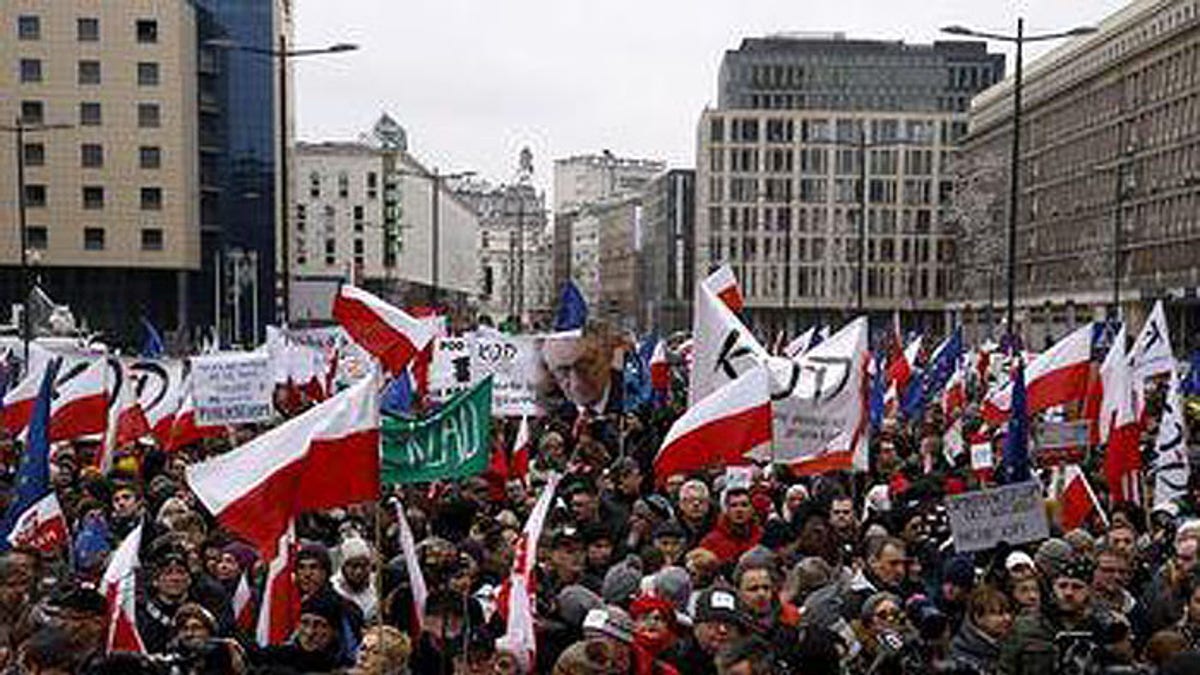
People gather during an anti-government demonstration for free media in front of the Television headquarter in Warsaw, January 9, 2016. REUTERS/Kacper Pempel
Relations between Poland and the European Union’s leaders hit a new low Wednesday, as the bloc’s executives met to investigate Poland’s recent limitations on democracy.
The move followed protests last weekend in Warsaw, where tens of thousands of Polish supporters of democracy braved the bitter cold to decry a new law empowering the government to muzzle state radio and television.
The law, rushed through the Sejm (Parliament) by the governing Law and Justice Party (known by its Polish acronym as PiS), gives the government complete control of state radio and television. Key managers have been sacked and replaced with PiS political appointees. The European Union has condemned this action.
Government officials claim this takeover of public media is necessary to promote national traditions and patriotic values. Pride in Polish identity is a hallmark of the new government, which abhors western European values.
The largest demonstration was in Warsaw where 20,000 people protested in front of the State Broadcasting Center (TVP). Many taped their mouths shut in sympathy with the broadcasters who have been silenced.
Demonstrators carried placards mocking the government as a “Democratic Dictatorship,” in reference to what is seen as a rapid move toward an authoritarian state.
The Committee for the Defense of Democracy organized the protests. “We are meeting because the freedom of the media is being threatened by this new law,” said spokesman Mateusz Kijowski. “If the media cannot see what the authorities are doing, the people will be ignorant of the government’s activities.”
“It was clearly a defiant, but civil demonstration,” said Marek Jezowski, a financial public relations advisor who attended the Warsaw rally. Similar demonstrations took place in 20 Polish cities and towns, making opposition to the government a national movement.
Many moderate Poles who thought PiS would be an alternative to its corrupt predecessor, the Civic Platform, were soon disappointed. Just one month after the PiS landslide victory, 56 percent of Poles said that democracy was threatened, according to a national poll conducted last November.
“The state media will no longer serve as the public’s watchdog.”
Lech Walesa, who led the Solidarity movement against Communist oppression, has joined in the denunciation of the government. “This government acts against freedom and democracy,” he said. “Not to mention that it makes us look ridiculous to the rest of the world.” Walesa was president of Poland from 1990 to 1995.
“The state media will no longer serve as the public’s watchdog,” said Dorota Glowacka, an attorney at the Helsinki Foundation for Human Rights, in a phone interview with Fox News from the foundation’s Warsaw branch.
PiS introduced another bill that gives law enforcement access to the Internet activity of citizens without requiring court consent. Opposition lawmaker Krzysztof Brejza warned such legislation turns Poland into an Orwellian state where surveillance is everywhere.
Glowacka echoed this fear. “It’s a step toward uncontrolled mass surveillance,” she said. “That’s my biggest worry.”
These lightening-swift changes since the October 25 election have crippled the nation’s top court, fundamentally changed the professional civil service, and now threaten to make the public media an arm of government policy.
“It reminds me of the Communist takeover of the country in the 1940’s,” said Andrzej Zoll, a former ombudsman for the constitutional court.
The European Union is an existential threat to Catholic Poland, according to the PiS worldview. The government intends to galvanize national pride and discard unpatriotic narratives.
This emphasis only on a positive historical narrative will have a negative impact on serious scholarship, according to author Konstanty Gebert, a columnist for Gazeta Wyborcza, Poland’s largest newspaper.
“Our past will become glorious and immaculate again,” Gebert told Fox news. “And we risk losing the insights we worked so hard to achieve.”
In recent years, Poland’s scholars have done objective research into the nation’s history, including dark chapters such as Polish complicity in the murder of Jews.
Some Poles interviewed for this article believe the government’s ultimate objective is to crush all opposition and deliver a mortal blow to democracy. Others are hopeful that the deeply rooted yearning for democracy will prevail.
Despite 51 years of oppression – six years of Nazi occupation and 45 years of Communist rule – Poles were able to build a vibrant democracy following the collapse of Communism in 1989.
